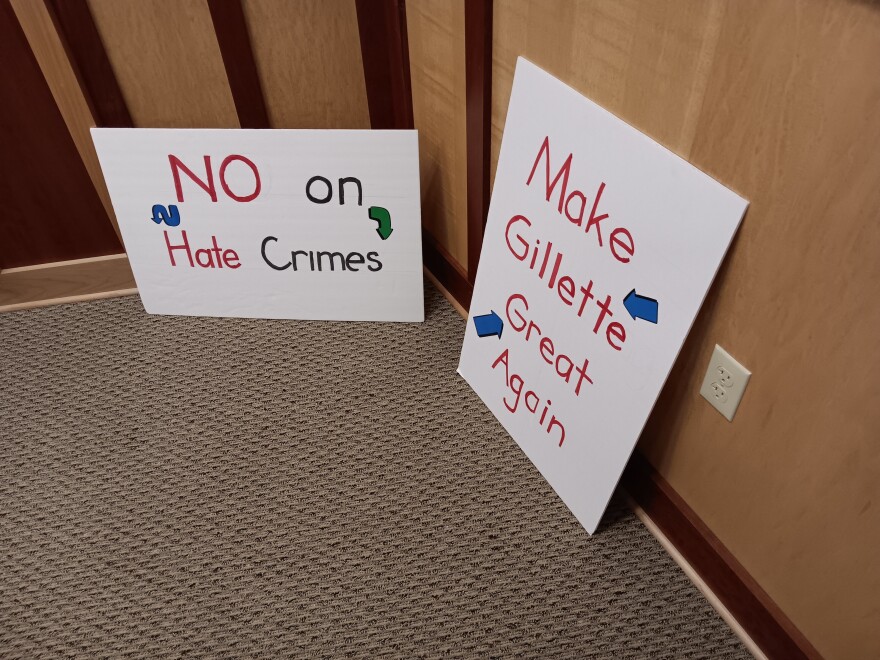The Gillette City Council voted in favor of implementing a “malicious harms ordinance” on another 4-3 vote on June 6. It comes after the ordinance was narrowly approved on two other 4-3 votes on its two other readings. Gillette joins Cheyenne, Casper, Laramie, and Jackson, which have similar ordinances. Wyoming and South Carolina are the only two states that don’t have a statewide hate crime law.
The city council chamber wasn’t as full as the meeting for the second reading of the ordinance. But public comment, a presentation by city attorney Sean Brown, and council debate lasted approximately an hour and 45 minutes. The majority of public commenters opposed the ordinance at this meeting, with 22 of 29 speaking out against it. Some attendees walked out before the vote was held.

According to city communication manager Jennifer Toscana, the city received a total of 138 email messages on the ordinance since it was introduced, with 80 in support and 58 opposed. However, this doesn’t include private emails, texts, or opinions voiced to council members outside of these messages that were sent via the city’s council and mayor messaging service.
Before the vote and public comment, City Attorney Sean Brown gave a presentation to address some of the concerns on the ordinance, such as constitutionality and how it would be used.
“Sometimes when you hear people talk about what is constitutional, or what is not constitutional, what they mean is that something is or is not constitutional, based on how they interpret the Constitution,” Brown said. “When I give you all legal advice, that's not what I'm doing. What I'm doing is looking at how the judicial branch or courts, either in Wyoming or around the country, have interpreted the constitution to say whether something is permissible or not.”

Brown added that Wyoming courts have not addressed the legality of hate crime legislation specifically, which leaves some uncertainty in this area. State and federal courts have also generally upheld hate crime laws.
The opinions voiced by attendees during public comment were once again sharply divided.
“This ordinance isn't going to do anything. You've seen it passed in other cities; you've seen it passed in other states. Go on YouTube, go on TikTok, watch the news at night. What are these ordinances done for this country, for this community, for the state? asked Rodger Solomon. “They've only made things worse. You need to be creative. You're the leaders of this city. Can you not come up with something better than let's do what everyone else does?”

For others, the feel of the community has shifted from what it once was, which is why they felt the ordinance was needed.
“I've lived here since 1976, and when I moved to Gillette, [the attitude was] you mind your business, I’ll mind mine. And something has changed. You can hear it in this room,” said Dara Corkery. “Let's respect one another. There are threats in our community.”

Cheyenne adopted an “anti-bias” ordinance in March 2022 that’s similar to Gillette’s. They both state that it is a criminal offense for someone to target other groups or people with malicious intent due to someone’s race, color, religion, sex, sexual orientation, gender identity, gender expression, ethnicity, national origin, ancestry, or disability, or age. Cheyenne’s also includes language for political affiliation, which isn’t included in Gillette’s version.
Cheyenne’s ordinance also prohibits a person from “maliciously and with specific intent” inciting or creating imminent violence toward someone because of these characteristics. This includes communication via phone or text message, or to allow for the distribution of this content. Gillette’s doesn’t include this specific language.
“It was very interesting [in that] we had a large group of folks who very quietly supported it, and we had a smaller group of folks that very vocally opposed it,” said Cheyenne mayor Patrick Collins. “We never expected that it would be used a lot.”
Collins said that since it was enacted, it’s only been used twice. Their ordinance, he said, differs from others including Gillette’s in that it includes language about planning and then carrying out an act.
“In our ordinance, it takes harassing somebody and then taking a second step and assaulting or doing something else, and so it's a two-step process,” he said of the Cheyenne ordinance. “That's not the typical thing that you see, I think, in any community, but we thought it was really important to assure people like our military, we bring people from all over the world.”
Gillette’s ordinance was introduced by councilman Billy Montgomery, who took the idea from Cheyenne’s anti-bias one. Collins added that Cheyenne city council president Richard Johnson was inspired by an ordinance in Tulsa, Oklahoma.
The Gillette ordinance was amended to add age to the list of protected classes. That amendment was approved at the June 6 meeting and was the one that was approved on third reading.
Councilwoman Tricia Simonson unsuccessfully requested tabling the ordinance for another month to allow more time for debate and other consideration. She added that Casper’s ordinance that was adopted in late 2022 took nearly a year and a half before it was approved, and that Gillette’s needed more debate and time before the public.
Gillette Mayor Shay Lundvall addressed the contentious atmosphere that has come over the city council and the divisive feelings it's stirred up and the want to not have this detract from the overall mission of their work.
“In this council, we've experienced a lot of motion just like everybody else [over the divided opinions on the ordinance]. This has not been easy…this is one of the things that there's no script for how you handle something like this when you get elected,” Lundvall said, who voted against the ordinance in all three readings. “I believe that we are a very welcoming community. We have everything in place. We have a fine police department [and] first responders.”
The ordinance will go into effect next week.









